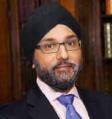Medical Qualification
Mr Ranjeev Bhangoo qualified from Leicester Medical School where he was awarded the Victor Ludorum and the Medical School Gold Medal and Honours. Further to general surgical training and Fellowship of the Royal College of Surgeons, England, Mr Bhangoo went on to complete specialist neurosurgery training for which he was awarded the prestigious Norman Dott Gold Medal in Neurosurgery as the highest ranked neurosurgical trainee in the UK.
Medical Experience
In 2007 Mr Bhangoo began research at The Institute Gustauve Roussy in Paris, France, Europe’s leading cancer institute. He specialises in the latest minimally invasive treatments for brain tumours and is fully trained in both CyberKnife® and Gamma Knife® radiosurgery. He has a particular interest in the treatment of spinal conditions.
Mr Bhangoo is a Consultant for the London Neurosurgery Partnership and the London Clinic Cancer Centre.

